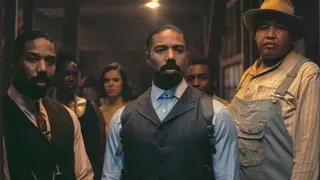June 14, 2012
Debate Shadows Israeli Films at Frameline
Chris Sosa READ TIME: 8 MIN.
Pro-Palestinian activists are calling foul on Frameline, which opens today (Thursday, June 14), and are attempting to increase pressure on the international LGBT film festival to ditch Israeli government funding.
The festival, which runs through June 24, will present two Israeli films, one about Palestinians, but no Palestinian films were submitted this year to the festival committee, said K.C. Price, executive director of Frameline.
Earlier this year, Palestinian supporters got a hold of an internal document leaked from the Jewish Community Federation of San Francisco. The 20-page report that outlines how to counteract protesters at the festival was published in March 2011. It demonstrated a collaborated and organized effort between Frameline, the Israeli Consulate, and programs within the JCF, critics claim.
JCF is a multi-million dollar organization, according to its 2010 IRS filing, and supports a variety of organizations and programs within and outside of the Jewish community in San Francisco, San Mateo, and Sonoma counties. Neither of the two other Bay Area Jewish organizations located in the East Bay and Silicon Valley is currently working with Frameline, said Price.
JCF helps promote Israeli films and filmmakers shown at Frameline, Price said.
The release of the document came two months before Frameline's announcement of its 2012 season, but it hasn't gained much traction in the media beyond a few blogs and articles, including an April article on the blog Mondoweiss.
Community leaders on both sides of the issue were reluctant to speak about the leaked document - a compilation of media coverage, mostly in the Bay Area Reporter, of pro-Palestinian protests by Israeli and Jewish supporters of Frameline along with internal emails between Frameline, the Israeli Consulate, and JCF program executives.
The report apparently serves as a blueprint of how to proactively respond to pro-Palestinian activists' attacks and accusations of so-called pink washing against organizations receiving Israeli government support.
Palestinian supporters claim the document is evidence of a convoluted relationship and is an example of a well-funded, organized campaign that is putting rose colored glasses on the queer community.
"It's hugely problematic. It's one thing to applaud very real advances for the LGBT folks in Israel, and those should be applauded, but it's another thing entirely, essentially, for gay cultural organizations and outfits to get into bed with the Israeli government and allow themselves to be used as a pawn for Israeli foreign policy," said Cecilie Surasky, the out lesbian deputy director of Jewish Voice for Peace, an Oakland-based organization.
Surasky pointed out that Israel has been condemned by human rights organizations, including Amnesty International and Human Rights Watch, for human rights violations against Palestine, including discrimination and use of force. Some of those same groups, however, have also condemned the Palestinian Authority for not respecting freedom to assemble and beating up protesters.
Harris Kornstein, who worked for Frameline from 2008 to 2011, and who spoke out about the organization receiving support from the consulate, also expressed concerns.
"It fits in line with what I see as a very organized strategy on the part of the Israeli Consulate and related Jewish Zionist organizations to get the LGBT community in San Francisco ... to play up Israel's support of certain LGBT issues as a way of 'pink washing' Israel's abuses toward Palestinians," said Kornstein, a 28-year-old queer Jewish anti-Palestine occupation activist.
"By taking the money Frameline is clearly aligning itself with the government," added Kornstein, pointing out that the issue isn't about a few thousand dollars to cover travel and lodging expenses, but about a "very deliberate campaign."
It's a "no brainer" to reject that money from a government that perpetuates human rights violations and "wants to use your institution as a marketing vehicle," added Surasky, 46. She said the same should be true for China, Syria, and any other country with atrocious human rights records.
In 2005, two different public relations firms found that Israel's global public image was at an all-time low. That was the beginning of Israel's branding campaign, reported Sarah Schulman, who documented the history of the campaign in an article published by http://www.Prettyqueer.com.
One piece of that campaign is waving the rainbow flag, said Schulman.
Schulman, an academic, activist, and author, has been speaking out against Israel's pink washing campaign. She also organized an LGBT Palestinian tour of the U.S. in 2011 and a delegation of U.S. LGBT academics and community leaders to Palestine earlier this year.
The bottom line is that the anti-Israel occupation activists don't care about how much money Frameline receives from the consulate; one penny is too much. They simply want the organization to stop accepting funding and colluding with a government they contend silences people's voices, violates human rights, and uses the queer community in Israel's rebranding campaign.
What's the big deal?
Queer Jewish, Israeli, and Frameline leaders' response has been somewhat nonchalant. In interviews they all have brushed off the report as being nothing out of the ordinary between organizational leaders.
"I am actually proud of the way in which the Jewish community - especially the queer Jewish community - and people who are supportive of the queer Jewish community in the Bay Area are well networked and the way in which they collaborated on this matter," said Donny Inbar, Ph.D., associate director for arts and culture at the Israel Center housed at JCF.
Akiva Tor, consul general of Israel in San Francisco, disapproved of "private emails" being published, but said he, "didn't see anything wrong in the published communications."
Price expressed fascination with the controversy, but maintained the same position he has all along - that Frameline is an arts and cultural organization and doesn't take a political position.
"As an arts and culture organization we just don't take political points of view," said Price, pointing out that many of the films the organization screens are highly critical of their own countries. To exclude one country's films, filmmakers, or funding turns into a slippery slope, he added.
"I find it really fascinating that Frameline is a lightning point for this more so than other film festivals, which is curious to me," said Price, who estimated the consulate provides up to $4,000, depending on the number of Israeli films selected for the season.
Frameline doesn't receive support from the consulate every year, he said.
It is a common practice for foreign consulates and the U.S. State Department to pick up artists' travel and lodging expenses for cultural organizations such as film festivals, said Price, Tor, and other film festival representatives.
The funding doesn't impact organizations' programming because the films are already selected by the time the consulates get involved, Hilary Hart, director of publicity of the San Francisco Film Society, which produces the annual San Francisco International Film Festival, told the B.A.R.
Protesters haven't demonstrated at SFIFF for the festival accepting support from the Israeli Consulate, she said.
Desert gold
Israel's film industry is producing interesting, quality films, said Hart, Price, and Inbar.
Unfortunately Palestine doesn't have a strong film industry "for obvious reasons," Hart added.
"There is a lot of really powerful LGBT cinema coming out of the Middle East and Israel right now," said Price. "There are a lot of voices that need to be heard in the Middle East and Israel. These films are being made and we are screening them because they are high quality, important works that are coming from that region."
Many of the films are critical of Israel and the executives said they would welcome films from Palestine.
"God, of course! Absolutely! We not only welcome them we are always actively seeking them out," said Price. "We would be just thrilled to find high quality queer Palestinian films. I can assure you if we had a Palestinian submission about queer Palestinians we would be thrilled with it."
"If there are LGBT Palestinian films they should be showing them, no question," Tor agreed.
Seeing pink
Israeli leaders are miffed by anti-Israel occupation protesters' assertions of pink washing.
Tor complained that claims of pink washing are absurd. Anything Israel does "positive is negative," according to critics, he said. He wondered if Israel supported jazz artists or clean technology that would be labeled "jazz washing" or "clean tech washing."
"It's absurd. They've created a situation that anything that is good is a crime," he said, questioning where critics are when it came to opposing cultural artists' works from known repressive regimes like China, Cuba, or Iran.
This year's Oscar-winning foreign language film was from Iran, a country with a highly questionable human rights record, but the same outcry from protesters has been silent, Inbar pointed out.
"I've never heard a word about it, so Israel being singled out by these people, accusing us of pink washing - it's pernicious," Tor said.
It is the job of a "decent state" to support its films and "help our creators export" their work, Tor said, as well as being Israel's job to "do its best to explain itself to other liberal democracies."
A "good way to do that is by showing our culture," he said.
The consulate supports 14 cultural festivals from the Bay Area to Portland and Seattle as part of its cultural program, said Tor. Frameline is only one of those festivals.
Tor praised Frameline and the B.A.R. for resisting protesters' demands, adding it will continue supporting queer Israeli films long after the conflict.
Last year the paper published an editorial supporting Frameline's decision to accept the support of the Israeli Consulate and urged readers to support the LGBT film festival. The paper was not contacted in advance by Frameline, the Israeli Consulate, or JCF, said news editor Cynthia Laird. The editorial was discussed at the paper's regular editorial meeting, she said.
"I'm very, very happy that both the B.A.R. , in its editorial, and Frameline have resisted it because we've run into a situation that is really over the top," Tor said.
"Frameline has really, I think their heads are screwed on right. They understand these things exactly as they are," said Tor, believing Price accepts the reality of Israel as a state and place for art. "Therefore, there is a place for these films to be shown. They are not allowing themselves to be bullied."
Not angry enough, yet
Leaders and artists from both sides of the issue agree that the situation hasn't gotten to the point that it did at the Toronto International Film Festival where a successful anti-Israel occupation campaign motivated artists to boycott the festival in 2009.
Yet the message artists and activists sent to Toronto's film festival is the "same message that is being sent to Frameline," said Surasky.
Activists and leaders from both sides of the issue said they want an open and honest dialogue. Boycotting Frameline at this point isn't beneficial to the artists or the cause.
Yet they continue to point fingers at each other, claiming the other isn't honest. Attempts at a constructive dialogue haven't happened for a variety of reasons.
To accommodate protesters on both sides of the issue Price has made room for demonstrators in front of the Castro Theatre in recent years.
Kornstein agreed with Price that Frameline has been "relatively judicious leaving space for protesters" at the film festival, but he was critical that the organization wasn't as "generous with time and meeting with individuals."
"I was disappointed to see how closely K.C. Price was communicating with Donny Inbar and Lisa Finkelstein and some other folks [while], at the same time, [he] didn't actually meet with some of the other groups," said Kornstein.
Price isn't deterred, and acknowledged that the next step is facilitating "civil, ongoing dialogue around the situation."
Tor also extended an invitation.
"I invite them to the consulate when they want to come or organize a discussion or debate," said Tor. "I don't see any willingness on their side whatsoever."
Surasky was skeptical about a balanced conversation hosted by Frameline because the internal email exchange between the consulate and JCF showed how "enmeshed" the organizations are.
"Clearly, just in the fact that publication was created at all is telling; these are battles that are starting to happen all over the country," she said, referring to a younger generation questioning Israel's actions and policies toward Palestinians.
Lesbian filmmaker and anti-Israel occupation activist Barbara Hammer, 73, who has been a part of Frameline since its beginnings and plans to continue to participate in the festival, said she hopes the organization would decline the consulate's support.
At the same time, she believes, "Frameline would have an exciting festival if they opened the doors to this discussion. This does not have to be an argument where we lose our humanity toward one another."







